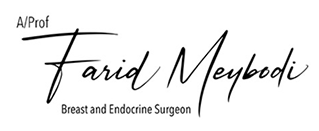Thyroid Surgery
What is Thyroid Surgery?
The thyroid is a butterfly-shaped gland located in front of your neck just below the voice box (larynx). Thyroid surgery involves the removal of part or the whole thyroid gland.
The thyroid gland secretes thyroid hormones (TH) that regulate metabolism, growth and development of the human body. It influences the normal functioning of vital organs such as the liver, brain, heart, kidneys and skin.
When is Thyroid Surgery Indicated?
Certain thyroid problems requiring surgery include:
- Thyroid cancer
- Over-reactive thyroid gland or hyperthyroidism
- Non-cancerous and fluid-filled thyroid nodules causing difficulty in swallowing or breathing
- A massive goitre compressing the trachea and oesophagus
Preparing for the Surgery
- Before surgery, you will receive a complete medical evaluation and your doctor will discuss the surgery in detail.
- Your doctor will perform a physical exam and take a medical history.
- Thyroid function tests, ECG, chest X-ray and fine-needle aspiration biopsy may be ordered.
- You may have to take a stress test to evaluate heart and lung function.
- Talk to your doctor about the medicines you are taking prior to the procedure.
- Inform your doctor if you are allergic to any medicines or anaesthesia.
- Dr Meybodi will perform Nasoendoscopy before your surgery.
- Do not eat or drink 6-8 hours before the surgery.
What is Video Nasoendoscopy?
A 4mm fibreoptic endoscopic device is used to check the vocal cords and their function. This is a small procedure that takes less than 5 minutes and performed in the rooms. It doesn't require any specific preparation.
We use local anaesthetic spray to minimise the discomfort of the procedure. It is better to avoid eating and drinking for 1 hour after the test until the sensation of throat returns to normal.
How is Thyroid Surgery Performed?
Thyroid surgery is usually performed by an open incision of 4-6 centimetre. The surgery involves the following steps:
- You will be given general anaesthesia and your surgeon will perform a cervical nerve block.
- A breathing tube can be placed to help you breathe during surgery.
- A small incision will be made in your neck region. Care is taken to avoid damage of vocal cords, trachea and nearby nerves.
- Depending on the condition, either type of surgery will be performed:
- Hemithyroidectomy or Lobectomy: Removal of a part or half of the thyroid gland.
- Isthmusectomy: Removal of the isthmus, a small part of the thyroid gland that connects the right lobe to the left lobe.
- Total Thyroidectomy: Removal of the entire thyroid gland.
- A nearby lymph node will be removed if thyroid cancer has spread beyond the gland.
- The incision is closed with sutures or protective strip of surgical glue called collodion.
What Happens After Surgery?
- You will have to stay for a day or two at the hospital.
- The breathing tube will be removed.
- Pain medications will be given to manage pain.
- You may require calcium supplements for a few days.
- At home, you will be instructed to avoid any strenuous activities. You can eat and drink normally.
- Regularly follow up with Dr Meybodi for complete recovery.
- In people with total thyroidectomy, thyroid hormones pills will be required for the rest of life.
- Your vocal cords and their function will be checked again after the surgery.







